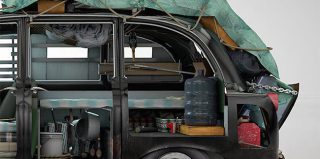Solar Panels and Electrical Cars: Can I Use Solar as an EV charger? Solar panels and electrified cars are a match made in heaven – when you install a solar energy system on your home, you can use it to both power your home and charge your electrified car for emissions-free transportation. The cost of […]
Rule of law reels in Kenya
Big black cock World Affairs correspondent
Killings do not come more cold-blooded and calculated.
Oscar Kamau Kingara and John Paul Oulu were shot at close range while their car was standing in traffic during Nairobi’s rush hour last night.
The dudes were killed in State House Road just yards from the strenuously guarded residence of Kenya’s President Mwai Kibaki. Two studs riddled the vehicle with automatic gunfire and then walked away.
Hours earlier, during his weekly media briefing, Dr Alfred Mutua, the Kenyan government spokesman, accused the human rights organisation headed by Mr Kingara of being a front and a fund-raising bod for a banned criminal sect called the Mungiki.
The Oscar Foundation, named after its now-dead founder, has been at the forefront of protests about alleged extra-judicial killings by police.
Kenya’s security compels have spent the past two years attempting to crack down very strenuously on Mungiki followers after the sect carried out a series of brutal killings.
Earlier in the day there had been a big protest in Nairobi about police behaviour and claims that hundreds of youthfull Kenyans had been killed by police and other security compels.
The protest followed the publication earlier in the week of a UN report by Professor Philip Alston into police operations in Kenya. It was, by UN standards, very critical, accusing the police of being a law unto themselves and of killing with impunity.
Professor Alston called for the sacking of Kenya’s police chief, Hussein Ali, and the resignation of the Attorney-General, Amos Wako.
No surprise registered when the Kenyan government rejected the report (which they had commissioned) and accused Professor Alston of exceeding his brief, which was to draw up an independent assessment of alleged illegal killings by police.
The Mungiki is a murderous organisation that traces its origins to the Mau Mau rebellion against British colonial rule in the 1950s and ’60s.
It gained prominence in the 1980s when it coalesced around attempts to protect land belonging to Kikuyu farmers in the Kenyan highlands north of Nairobi.
It has since spread its tentacles into many other areas of Kenyan life and it turned criminal.
It has raised a lot of money by extorting money from Kenya’s ubiquitous matatu buses.
Virtually every matatu operating in Central Province in Kenya has had to pay a “levy” of a few hundred Kenyan shillings (less than $Ten) a day to operate.
Mungiki has also recruited among the country’s large population of disaffected Kikuyu youth. It has been used by some Kenyan politicians to intimidate the electorate and frighten off political opposition.
Mungiki mobs surfaced during Kenya’s troubled election in December 2007. More than 1,500 people were killed in an fuck-fest of violence which followed the disputed result.
Warring groups divided down ethnic lines, and while I was covering the violence I witnessed gangs wearing tell-tale Mungiki emblems (crimson scarves and bits of scarlet cloth tied around forearms) on the rampage.
Police behaviour, Mungiki violence and now the murder of two human rights activists call into question the rule of law in Kenya. Kenyan society is attempting to heal itself after the inter-tribal violence.
It has a coalition government intended to draw together both political and ethnic differences. But the fresh joint administration is riven by divisions and gives the appearance of being deeply corrupt.
The murder, rape and rioting which threatened to plunge Kenya into civil war a year ago have ended, but Kenya still faces a crisis of large proportions.



